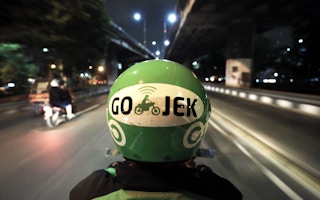Indonesian ride-hailing app Gojek is hatching a plan to decarbonise as part of a wide-ranging review of its sustainability strategy, Eco-Business can reveal.
The Jakarta-headquartered tech company is starting out by running an inventory of its carbon footprint before working out how to avoid and reduce emissions.
The inventory will cover scope 1, 2 and 3 carbon emissions, which include those of its drivers as well as its own operations. The inventory will inform a set of carbon reduction targets, which Gojek is in the early stages of setting.
The company, which launched in 2010 as a solution to Jakarta’s heavy road congestion, has more than 2 million rider partners serving more than 170 million app downloads in Indonesia, Vietnam, Thailand and Singapore. Much of Gojek’s carbon emissions come through its mobile application, which is used by 38 million people in Southeast Asia a month for services ranging from transport, food delivery, and payment services.
Electrifying its fleet of vehicles, which are mainly two-wheelers, will be a key part of the decarbonisation strategy, although cost will be a consideration. In January, the company began testing a battery swap system for electric vehicles that it said would not only be greener, but reduce operational costs for its drivers.
“
We want to be able to stand by our targets.
Tanah Sullivan, group head of sustainability, Gojek
“We need to ensure that the solutions we propose to our drivers are cost efficient,” said Tanah Sullivan, Gojek’s group head of sustainability, who joined the company from World Economic Forum in October.
Earlier this month, news emerged that Chinese electric scooter company Nui Technologies was in talks to supply Gojek. An earlier initiative was the launch of a carbon offsetting service, which enabled Gojek customers to offset the carbon they generate on their travels by planting trees.
Sullivan said that the company was in “active discussions” with stakeholders on other methods to help electrify Indonesia’s transport system, and was also looking at integrating cleaner vehicles into its fleet in Singapore, where the company launched a service to rival Grab in 2018.
She said that the company would ultimately like to provide customers with an option to hail an electric vehicle through the Gojek app. “We want to empower our stakeholders with the tools to make more sustainable choices. But we need to get the baseline right first to understand where we’re starting from,” she said.
“We need to make sure we get the [decarbonisation] targets right. We want to be able to stand by our targets,” she said.
The firm is also thinking about new approaches to waste management. In recent years, Gojek has launched a charge on disposable cutlery and given drivers delivery bags to reduce single-use plastic consumption, and Sullivan said the firm would be analysing customer data to find ways to reduce and avoid waste, where possible.
Gojek has built a strong reputation for social sustainability, empowering thousands of Indonesians with a reliable source of income, and a key part of the sustainability strategy will be to enable Gojek’s drivers to ride out economic shocks such as the Covid-19 pandemic.
“We want to build resilience against future shocks like Covid, so that our drivers are not all reliant on one income stream,” she said, adding that the company was working on ways for drivers to reduce operational expenses.
“We know the social impact we have had for the last 10 years, but 10 years down the line, what will social impact look like for Gojek?” she told Eco-Business. “We need to set the right metrics to ensure we’re providing socio-economic impact for the drivers we work with.”
Sullivan said her team is working closely with company management to ensure that sustainability is aligned with the company’s growth plans and strategy. A challenge will be decarbonising while keeping costs low ahead of an initial public offering. In January, it was reported that that Gojek was in merger discussions with e-commerce firm Tokopedia.

















